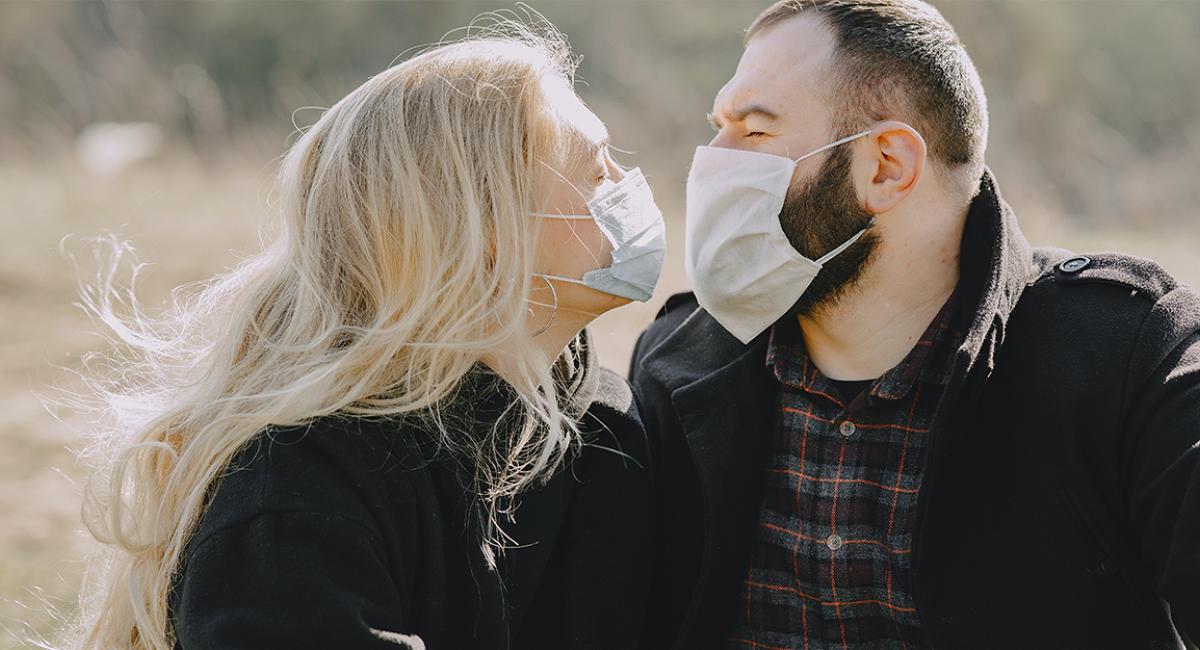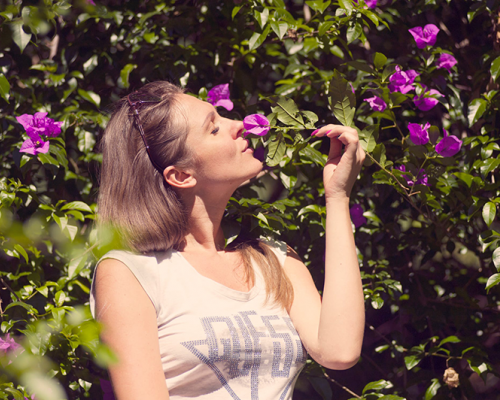Love in a COVID climate
Carol Harper considers the impact of the Covid pandemic on our relationships.
No one can be in any doubt about the devastation wreaked upon our societies by the effects of successive lockdowns. Across the world we hear the same stories of impending mental health crises, the impact upon our young of missed time at school, the grief and fear gripping the most vulnerable and the inequalities which allow some to profit while others fall into destitution. What has also hit the headlines is the impact of lockdown upon close relationships.
Negative news grabs and holds our attention: it puts us in a trance state in which we are subject to influence. The truth is more nuanced. According to a YouGov study in the UK, when it comes to those who are in a relationship, a third of people questioned said the pandemic has actually brought them closer to their partner. The most common response is that the coronavirus outbreak has had no implications on their relationship (53%) while just one in nine (11%) report that they and their partner have become more distant as a result of the disease.
‘.. A healthy relationship supports mutual needs satisfaction..’
Our human givens approach gives us useful insights into why relationships succeed as much as what happens when things go wrong.
Human beings, as all living organisms, have to take nourishment from the environment in order to survive and thrive. For us, these needs are emotional as well as physical and they, combined with the innate and life resources a person develops in order them to get their needs met, are what we call human givens.

A healthy relationship supports mutual needs satisfaction, although being dependent upon a partner to help us meet all of our emotional needs is not healthy. A balanced relationship will provide a sense of security, even when outside events seem to deny that need. Each partner needs control, autonomy and volition to maintain interests and friendships outside the relationship, these enrich their life as well as offering connection to the wider community. We need acknowledgement and recognition within our intimate relationships and wider circles. Both partners also, of course, need privacy: in lockdown this may have been in short supply but creative couples have found ways to have time on their own and give one another space. Creativity and the meaning people find in relationships may be at the heart of the shared experience.
Managing our expectations, especially those we have of others, is key to staying emotionally well and maintaining close relationships. In order to do so, we have to understand ourselves before we can begin to understand someone else.
Essentially there are three main reasons that prevent a person being able to get their needs met in healthy balance. The first we describe as a toxic environment where the home, workplace or other circumstances are contributing to stress and hostility. Living with anxiety and insecurity can lead people to feel out of control, and contaminate intimate relationships. Lockdown has created a ‘perfect storm’ for this. The second reason we give as contributing to unmet needs is ‘damage’ to our internal guidance system, this can include physical or psychological trauma to the brain, and unhelpful beliefs, conditioning or patterns of behaviour that people have brought with them into the relationship. Although it should not be considered damage, neuro-diversity in the human brain may lead to behaviours which challenge a relationship, for example in undiagnosed autism or Asperger’s.
The third reason is that the innate guidance system hasn’t been fully developed in the environment and people are missing coping skills. In these unprecedented times if one or both people in a relationship haven’t learned, for example, effective communication skills, anxiety or anger management skills, and relaxation methods. Mis-using the innate resource of imagination, for example, leads to rumination and catastrophising: the black and white thinking of emotional arousal becomes overwhelming.
Being in unexpected close confinement with a partner, and trying to find a balance of needs against a background of pressures, tests the most stable and solid of relationships and marriage guidance organisations such as Relate in the UK have had a surge of enquiries. Lawyers too have seen an increase in enquiries regarding separation and divorce throughout the various lockdowns and it is more than likely that the existing cracks in relationships have widened, leading to breakdown. The more couples can satisfy their needs in healthy ways which don’t impact negatively on the other, the more resilient each becomes, to their mutual benefit. Arguments, if they occur, tend to be more about my needs vs your needs and it’s helpful to remember that peoples’ behaviours are always an attempt – consciously or unconsciously – to get innate needs met, although not necessarily in a healthy way.
Friendships and LATs

The lockdown and other social distancing measures introduced a year ago meant that many people have been unable to see their friends compromising our need for intimacy, connection and friendship. Couples who live apart (‘Living Apart,
Together’), in many cases, were unable to meet; others found themselves living together. The impact of lockdown on relationships varies depending on age group. Nearly half a sample of younger people reported becoming more distant from their friends: but in the same age group nearly a quarter said they have become closer. Across all age groups 46% have reported a negative impact on friendships, with the over 60s being least affected. Perhaps the older we get, the better able we are to manage our expectations of circumstances and people. Life experience builds up our resources, helping us to develop resilience when things don’t go to plan.
‘Unprecedented danger’
According to surveys across the world, the additional stress of lockdown has been carried mostly by women and some commentators fear that it is a retrograde step in gender inequality, pushing women back into ‘traditional’ roles 1,2. The frustration and resentment this potentially fosters requires mature conversation between partners. We each need to recognise the influences on our lives which may have promoted taking stereotypical roles.
At worst, couples locked in abusive relationships have suffered in the extreme. Whether the abused partner is male or female, leaving is the most frightening and challenging scenario they face. In such an emergency situation, help is available from many quarters and some links are given below.
An article in the Irish Times from last autumn reported that ‘lockdown has been a time of unprecedented danger for people in abusive relationships. Calls to Women’s Aid went up by 43 per cent between March and June, and visits to its website rose by 71 per cent.’ A spokeswoman for Women’s Aid said that on average, 1000 more calls per month were received during lockdown and they saw no indication of that easing.
Back in 2011 HG practitioner Ros Jeal (now Townsend) detailed her insights into the behaviour of a client who repeatedly felt compelled to return to an abusive partner and how she was helped to change that behaviour which shares characteristics of addiction. All behaviours are an attempt to get our needs met and it was only after this client was able to imagine a different, positive outcome was she able to leave for good. “But he gave me flowers”. Human Givens Journal, Vol 18, No.3 - 2011. (P29).
Human givens practitioner Hannah Jackson’s podcast describes how she has helped a client leave an abusive relationship – Can you recover from psychological domestic abuse?
Our current fragmented society means that previous sources of support are not necessarily available and where perhaps a family member or friend may have provided a port in a storm, lockdown has made normal contact almost impossible. Acknowledging to ourselves and our partners that the situation feels really hard can help us accept the facts: and to reframe the experience as temporary helps us take the longer view.
What else can help
Clear methods of communication are essential as couples work through their relationship difficulties. Communication is non-verbal and verbal; people need to feel calm in order to take on board the information being communicated to them. Someone may insist they are calm but their body language or tone of voice, for example, betrays them.
‘Reflective listening provides quality attention...’
When difficulties arise in close relationships the tendency is to want to fix things for the other person, largely because we want to feel better ourselves. Leaping in too soon with advice and solutions can contaminate an intimate relationship as quickly as it might a therapeutic one. Reflective listening provides quality attention as well as helping a distressed person to calm down as they feel heard and validated. The LIFE model is one way to communicate effectively.
L - Listen. By listening reflectively and summarising back to the other person what we’ve heard, gives them an opportunity to confirm or modify our understanding. The most important element of this exercise is to let them know you’ve heard the emotion / feelings expressed in their story, for example: ‘Balancing working from home and home schooling the kids has been really hard for you’. N.B: AVOID saying e.g. ‘I know exactly how you feel!’ and then go on to talk about yourself.
I - ‘I’ statements enable the expression of how we feel about a certain behaviour or action. Starting a sentence with ‘you’ implies blame or criticism. E.g. ‘I feel irritated when you leave me to do the laundry. I know we’re both under a lot of pressure so please can we agree to take it in turns?’
F - Freedom – people should be allowed the freedom to ‘own’ their own problems. When a problem is perceived to exist, who actually owns the problem? We sometimes have to allow people the autonomy to make their own mistakes too. Hopefully they may learn something about themselves.
E - Everyone’s a winner – the importance of win-win negotiations. Zero-sum games end in power struggles and loss of relationships.
The Gottman Institute - www.gottman.com - has been the leading centre for research into relationships for 40 years. Their evidence-based approach has been adopted by practitioners throughout the world, including within our human givens training, and provides useful insights that can help couples think about their own communication with each other. Gottman’s Rule of Five, for example, states that for stability in a relationship a couple should have at least five times as many positive moments together as negative. Sadly, for many couples in lockdown, breakdown may be attributed to their ‘Four Horsemen of the Apocalypse’: criticism, contempt, defensiveness and withdrawal. Sometimes help from a third party is the best way to help break this cycle. Human Givens practitioners around the country offer couples counselling.
A useful exercise to help couples in lockdown, or indeed at any time, is completing an emotional needs audit. It can be a good starting point to uncover which unmet needs are leading to raised levels of stress or indeed to find that innate imagination and creativity can find opportunities and solutions where others may see danger if that resource is mis-used.
When unmet needs are identified, sincere communication and co-operation with our partners helps us work towards positive and achievable goals: and this is always about mutual needs satisfaction, whether it’s an agreement to separate, re-create or celebrate.
Resources
Just what couples need
Is your wellbeing being affected by self-isolation?
https://www.dw.com/en/coronavirus-tips-for-a-happy-relationship-even-during-lockdown/a-55961362
https://www.gov.uk/guidance/domestic-abuse-how-to-get-help
Food for thought
Let there be spaces in your togetherness, And let the winds of the heavens dance between you. Love one another but make not a bond of love: Let it rather be a moving sea between the shores of your souls. Fill each other's cup but drink not from one cup. Give one another of your bread but eat not from the same loaf. Sing and dance together and be joyous, but let each one of you be alone, Even as the strings of a lute are alone though they quiver with the same music. Give your hearts, but not into each other's keeping. For only the hand of Life can contain your hearts. And stand together, yet not too near together: For the pillars of the temple stand apart, And the oak tree and the cypress grow
not in each other's shadow.
Khalil Gibran, The Prophet
References
2. https://www.thelancet.com/journals/laninf/article/PIIS1473-3099(20)30568-5/fulltext#coronavirus-linkback-header.
© Carol Harper, March 2021
Latest Tweets:
Tweets by humangivensLatest News:
HG practitioner participates in global congress
HG practitioner Felicity Jaffrey, who lives and works in Egypt, received the extraordinary honour of being invited to speak at Egypt’s hugely prestigious Global Congress on Population, Health and Human Development (PHDC24) in Cairo in October.
SCoPEd - latest update
The six SCoPEd partners have published their latest update on the important work currently underway with regards to the SCoPEd framework implementation, governance and impact assessment.
Date posted: 14/02/2024











